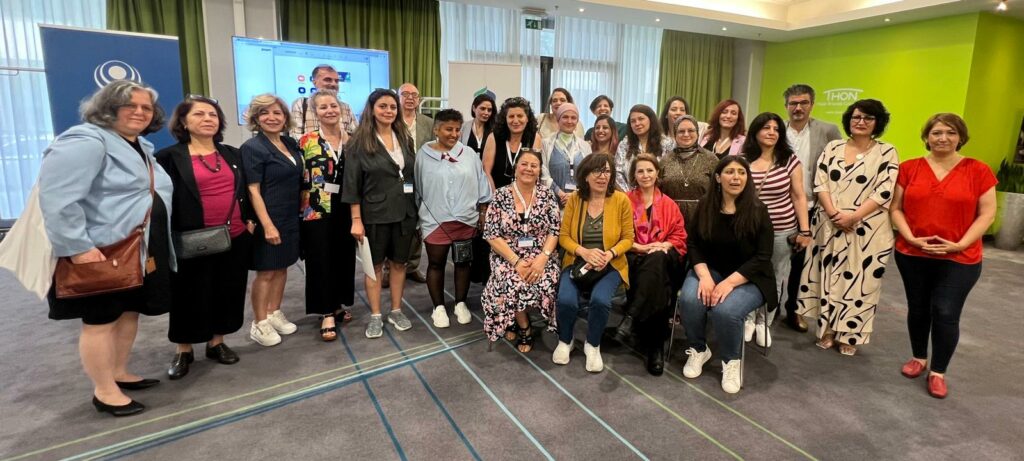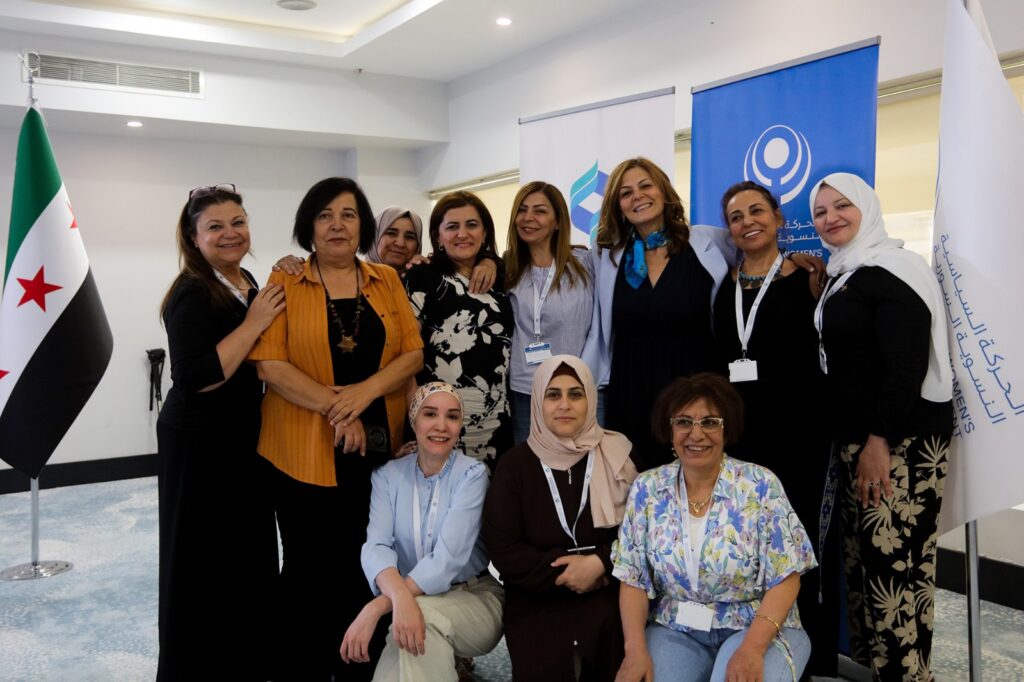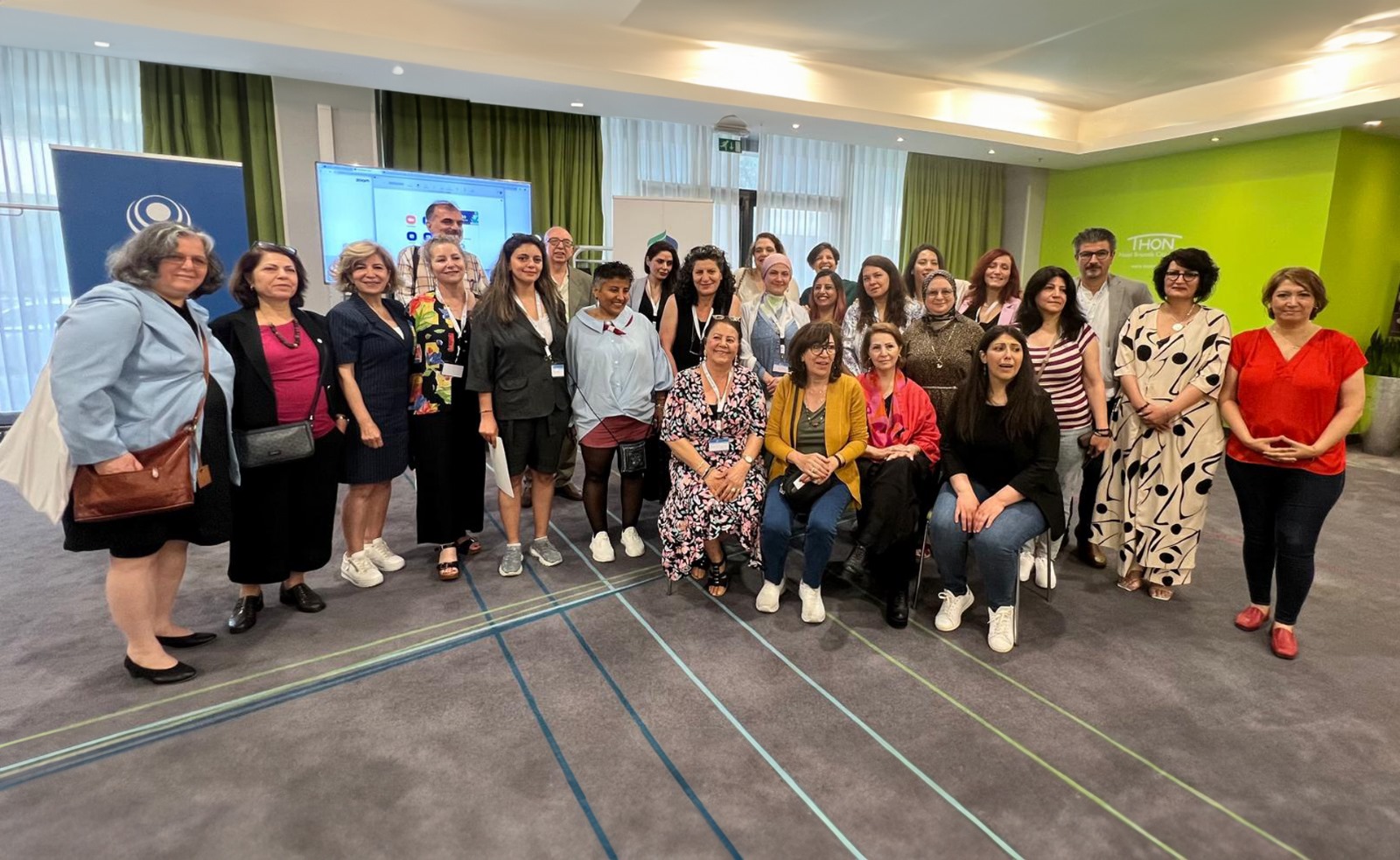Final Communique of the Sixth General Assembly of the Syrian Women’s Political Movement-June 28-30, 2024
- updated: July 2, 2024
- |


Under the slogan “Towards an Effective Feminist Political Path,” the Syrian Women’s Political Movement (SWPM) held its sixth annual conference, physically in Brussels, Europe, and Gaziantep, Turkey, in addition to virtual attendance by members from various regions inside and outside Syria. The total attendance was 78 members.
The conference commenced with a moment of silence to honor of the martyrs, in memory of the two deceased members, martyr Heba Haj Aref and feminist activist Firdaws Al-Bahra, and martyr Nasser Bandak, who was killed in the regime’s detention centers and was the husband of movement member Fariza Jahjah. Members of the General Assembly delivered opening statements from the three conference locations (Nabiha Al-Taha, Kibria Al-Saour, Amal Naeem).
The attendees, both physically and virtually present, discussed the movement’s organizational, administrative, and financial reports, as well as the report of the Oversight Committee. They also discussed the political report, which presented and analysed the Syrian political situation and its connection to regional and international issues. Additionally, they reviewed a paper expressing the movement’s position on the form of governance in future Syria, adopting a mixed/semi-presidential system as the form of governance for the coming Syria. Four new members were elected to the General Secretariat and the Oversight Committee through a secret ballot.
The conference concluded the following:
- The SWPM emphasized that the issue of detainees and forcibly disappeared persons is a humanitarian matter that transcends negotiations. SWPM reaffirmed its full support for the International Commission on Missing Persons to pressure the Syrian regime and all parties to find a radical solution.
- The SWPM discussed the tragic situation of Syrian refugees in neighboring countries, particularly Turkey and Lebanon, and the violations and pressures they face for deportation or forced return, which expose them to severe security risks. The SWPM called on host countries to adhere to international agreements regarding refugee protection and stressed that the return must be voluntary and safe.
- In its political report, the SWPM discussed the poor economic and living conditions in all regions and their impact on women and marginalized groups amid the absence of all life and resilience components for Syrians, alongside rampant corruption and security chaos.
- The SWPM discussed the early recovery issue and emphasized the need to ensure fair distribution of aid across all Syrian regions, taking gender considerations into account in the distribution. They stressed the importance of ensuring that aid is not exploited politically and that it should pass through civil organizations under transparent international oversight mechanisms to prevent its use in rehabilitating the regime or solidifying de facto authorities and warlords.
- The SWPM praised the ongoing peaceful movement in Sweida for nearly a year, valuing the active participation of women in the movement and their fundamental role in the Square of Dignity. The SWPM expressed concerns about the regime’s use of violence against this peaceful movement and called on international bodies to do everything possible to protect peaceful female and male demonstrators.
- The SWPM is deeply concerned about attempts to normalize relations with the Syrian regime and fears its rehabilitation and reintegration, which negatively affects the interests of Syrians. The SWPM affirmed that the only path to ending the conflict in Syria is a comprehensive political solution in accordance with UN Resolution 2254 and related international resolutions.
- The SWPM discussed the Israeli aggression on Gaza, condemning the genocide against the Palestinian people, and rejected attacks on civilians by all parties, as well as rejecting Syria being used as a battleground for regional conflicts.
- The SWPM emphasized the importance of accountability and justice, welcomed the decision of the French Court of Appeal condemning Bashar al-Assad for the use of chemical weapons, and viewed justice as a right for all Syrians and a responsibility of judicial bodies worldwide and democratic countries that uphold the Universal Declaration of Human Rights. The SWPM believes that justice will not be complete without holding all war criminals in Syria accountable.
- The SWPM stressed that a political solution and sustainable peace in Syria cannot be achieved without the active participation of women. Therefore, they adopted the slogan “Towards an Effective Feminist Political Path” to emphasise the role of Syrian women and the necessity of their presence in all stages of the political process.
